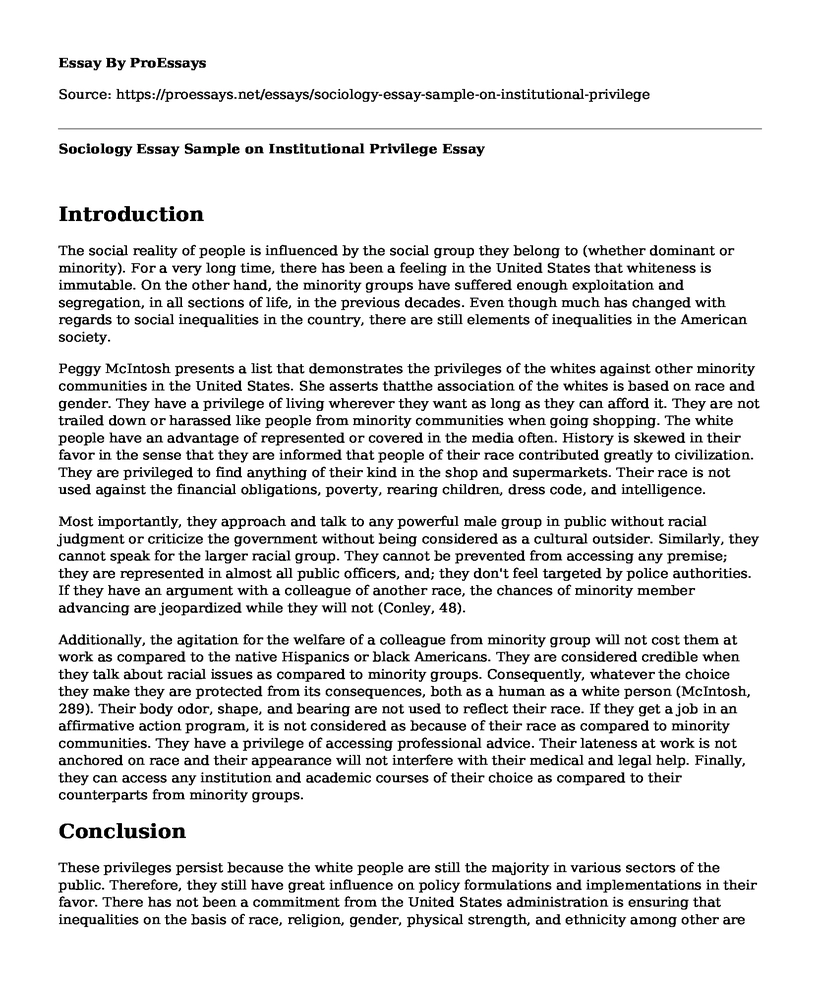Introduction
The social reality of people is influenced by the social group they belong to (whether dominant or minority). For a very long time, there has been a feeling in the United States that whiteness is immutable. On the other hand, the minority groups have suffered enough exploitation and segregation, in all sections of life, in the previous decades. Even though much has changed with regards to social inequalities in the country, there are still elements of inequalities in the American society.
Peggy McIntosh presents a list that demonstrates the privileges of the whites against other minority communities in the United States. She asserts thatthe association of the whites is based on race and gender. They have a privilege of living wherever they want as long as they can afford it. They are not trailed down or harassed like people from minority communities when going shopping. The white people have an advantage of represented or covered in the media often. History is skewed in their favor in the sense that they are informed that people of their race contributed greatly to civilization. They are privileged to find anything of their kind in the shop and supermarkets. Their race is not used against the financial obligations, poverty, rearing children, dress code, and intelligence.
Most importantly, they approach and talk to any powerful male group in public without racial judgment or criticize the government without being considered as a cultural outsider. Similarly, they cannot speak for the larger racial group. They cannot be prevented from accessing any premise; they are represented in almost all public officers, and; they don't feel targeted by police authorities. If they have an argument with a colleague of another race, the chances of minority member advancing are jeopardized while they will not (Conley, 48).
Additionally, the agitation for the welfare of a colleague from minority group will not cost them at work as compared to the native Hispanics or black Americans. They are considered credible when they talk about racial issues as compared to minority groups. Consequently, whatever the choice they make they are protected from its consequences, both as a human as a white person (McIntosh, 289). Their body odor, shape, and bearing are not used to reflect their race. If they get a job in an affirmative action program, it is not considered as because of their race as compared to minority communities. They have a privilege of accessing professional advice. Their lateness at work is not anchored on race and their appearance will not interfere with their medical and legal help. Finally, they can access any institution and academic courses of their choice as compared to their counterparts from minority groups.
Conclusion
These privileges persist because the white people are still the majority in various sectors of the public. Therefore, they still have great influence on policy formulations and implementations in their favor. There has not been a commitment from the United States administration is ensuring that inequalities on the basis of race, religion, gender, physical strength, and ethnicity among other are adequately eliminated, even though there is progress. Traditional social structures like family, school, politics, and economics as well as religion still exercise these inequalities whether unknowingly or knowingly, hence, its continued persistence. To advance this privileges and advantages to all, structural inequalities and the mechanism that supports it must be destroyed in terms of employment, education, health, judicial service, and social mobility. Policies that discourage and punishes those exercising the vice should be formulated and implemented. Creation of awareness to all members of the society where everyone is equal is necessary. Lastly, the implementation of the American declaration that all men are created equal should be the guiding principle.
Work Cited
Conley, Dalton. You may ask yourself: An introduction to thinking like a sociologist. WW Norton & Company, 2011.
McIntosh, Peggy. "White privilege and male privilege." Race, Ethnicity and Gender: Selected Readings (2007): 285-305.
Cite this page
Sociology Essay Sample on Institutional Privilege. (2022, Jun 23). Retrieved from https://proessays.net/essays/sociology-essay-sample-on-institutional-privilege
If you are the original author of this essay and no longer wish to have it published on the ProEssays website, please click below to request its removal:
- Paper Example on Virtual Child Pornography: Why It Is Entirely Unethical
- Essay Sample on Negative Peer Pressure
- Essay Example on Family Dynamics: Love, Loyalty, Disappointments & Beyond
- Essay Example on Born Ready for Connection: The Still Face Experiment
- Paper Example on Roe v. Wade: Society's Debate On Abortion
- Free Essay Example on Mass Media: A Comprehensive Introduction to Modern Communication Channels
- Essay Sample on Information Dilemmas in Nursing







